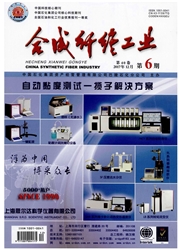

 中文摘要:
中文摘要:
以硬脂酸丁酯为芯材,2,4-甲苯二异氰酸酯(TDI)和季戊四醇为反应性单体,采用界面聚合法制备网状结构囊壁聚氨酯相变储热微胶囊.扫描电镜图片显示所制备相变微胶囊表面光滑致密,颗粒分散均一;当TDI与季戊四醇质量比为2:1时,高温烘干后微胶囊质量损失率最低,致密性最好;所制备相变微胶囊的熔融温度和熔融热焓分别为22.5℃和86.37J/g,在室温范围具有良好的储热性能.将相变微胶囊用于智能纺织品的制备,研究了黏合剂浓度及微胶囊用量对织物增重的影响,探讨了焙烘温度以及焙烘时间对调温织物耐水洗性能的影响.通过工艺优化得到相变微胶囊的最佳整理工艺为:相变微胶囊的质量浓度为70g/L,黏合剂质量浓度为60g/L,于120℃焙烘3min.经整理后的织物在相变材料的相变温度附近具有良好的控温性能.
 英文摘要:
英文摘要:
Polyurethane phase change thermal storage microcapsules were prepared by interra- cial polymerization using butyl stearate as core material, 2,4-toluene diisocyanate (TDI) and pentaerythritol as reactive monomers. The results of scanning electron microscope show that the microcapsules are homogeneous, and the density of the microcapsule is the best when the mass ratio of TDI/pentaerythritol is 2: 1. The melting temperature and the melting enthalpy of the phase change microcapsules were 22.5 ℃ and 86.37 J/g and it can keep good heat performance at room temperature. It was used for the preparation of intelligent textiles. The effect of binder concentration and dosage of microcapsule were studied for fabric weight. The influ- ence of curing temperature and baking time on the wash ability of the fabric was discussed. The finishing process for phase change microcapsules was determined through process optimization, the microcapsule is 70 g/L, binder 60g/L, curing temperature and baking time 120 ℃ and 3 min respectively. The fabric finished has a good temperature adjusting performance near the phase transition temperature of phase change materials.
 同期刊论文项目
同期刊论文项目
 同项目期刊论文
同项目期刊论文
 期刊信息
期刊信息
